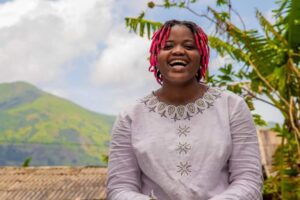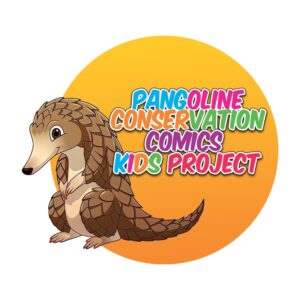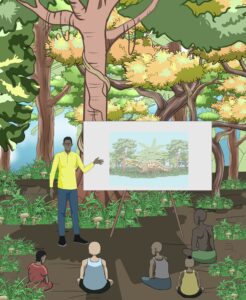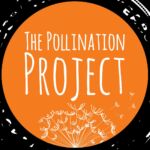Tens of thousands of pangolins are trafficked and killed every year, National Geographic.
“It gives me hope when I see that other humans are gradually realizing that animals have feelings and every little effort counts. You don’t need billions to change the world, you need a willing and daring heart, a heart willing to sacrifice its selfish desires for the greater good,” Afungfege Evita, Pangolin Conservation Comics Kids Project.
Injustice does not cease to exist just because we turn a blind eye to it and, although it takes much work and courage to achieve a real change in the world, there is nothing more satisfying than acknowledging a problem and being part of the solution. The tragic fate that the most trafficked non-human mammal faces is what inspires Afungfege Evita to advocate in Cameroon for the pangolin.
The Truth Behind The Bush Meat

Evita was born in the village of Bambili, in the Tubah Subah subdivision of Cameroon. She was raised by her mother and an extended family who values education and takes pride in working the land.
Evita earned an MSc in Communication and Development at the University of Bamenda and plans to pursue a master’s degree in Cultural and Creative Industries. But little did she know that buying meat from a local hunter would spark in her the need to advocate for one of the most vulnerable animals in the world: the pangolin.
“In my village, there’s this hunter who always brings us meat to buy, and he will always use the term ‘bush meat’ which means the flesh of any animal that lives in the forest,” explains Evita. “A few years back, while I was on a holiday in my village, my cousins brought home a big snake. I still remember how big and long it was. It took three of them to carry it. Gallivanting in happiness they kept shouting ’bush meat’. Since then, whenever the hunter came to sell the usual ’bush meat’ I started asking questions about what kind of ‘bush meat’ exactly it was and got many answers: porcupines, antelopes, monkeys, pangolins, and many more. I was shocked.”
Unfortunately, many Cameronians prefer “bush meat” over livestock because it is cheaper and easier to find, and the killing of endangered species is part of a long-time tradition.
“Leaders in my community and their traditions encourage the killing of endangered species by awarding titles to hunters and there’s no prosecution for these vile acts,” says Evita. “This enraged me. The realization that animals like the pangolin, which is endangered, are poached and eaten daily because we do not ask the right questions of where the ’bush meat’ comes from inspired me to create a project that could make a difference”.
The Most Trafficked Non-Human Mammal
The pangolin is a peculiar and harmless scaled mammal whose eight species live across Africa and Asia, according to National Geographic. Unfortunately, these shy animals are considered the most trafficked non-human mammals in the world, reaching tens of thousands per year. Their main market is Asia where they are sold for their meat and scales.
Cameroon hosts three species of pangolin: white-bellied, black-bellied, and giant. The white-bellied pangolin was listed as an endangered species in 2019 by the IUCN, its population has decreased by 40% in the last 21 years because of the loss of their habitats and its trafficking. Between 2015 and July 2019 the scales of 400,000 pangolins were seized while being trafficked to Asia.
The giant ground pangolin has also been listed as an endangered species in 2019 by the IUCN, with an estimated 50% loss of its population from 1974 to 2019 and it continues to drop due to habitat loss and trafficking.
The black-bellied pangolin has been listed as vulnerable by the IUCN in 2019, and if the hunting, mining, and logging, as well as the trafficking continues, their population will decrease 30 to 40% in the next 7 years.
Advocating For The Pangolin
Being actively involved with her surroundings and taking care of the environment is something that Evita learned from her mother.
“My mother encouraged me to acknowledge the relation between people and the environment,” recalls Evita. “She saw agriculture as a priority, a source from which we obtained our food and our income, something that passed down from generation to generation.”
In this culture of working and caring for the land, the pangolins have an important role, because of their insectivore eating habits, they help farmers by getting rid of the termites that are a danger to their crops.
The need to advocate for the pangolins sparkled in Evita but she knew that the most difficult aspect of her work would be to change the mindset of the most traditional villagers.
“Here the main idea is that killing any exotic animal is a prime achievement,” says Evita. “Thus it’s difficult to change the mindset. Gradually I see many people beginning to question the old principles and starting to think about animal well-being.”
 Evita decided to approach her advocacy from a different perspective that would create a ripple effect of care and respect for the lives of pangolins in her village, in Cameroon, and the world.
Evita decided to approach her advocacy from a different perspective that would create a ripple effect of care and respect for the lives of pangolins in her village, in Cameroon, and the world.
“I am a creative storyteller, I use fiction films, documentaries, and animations to tell stories about issues I am passionate about. In this case, I wanted to approach pangolin conservation from a different perspective,” says Evita. “After researching previous work done by other passionate people working on conservation, I wanted to target a different niche that most often is underlooked: children. Back in primary school, I could vividly remember the absence of conservation knowledge in the stories we were meant to study, which animals are endangered, and what positive actions to take. Children today happily demand and consume ’bush meat’ because they are influenced by their parents. This cycle can continue for years until the pangolin ceases to exist. When there is a demand, it forces poachers to meet this demand and it becomes a livelihood. So I decided to create a comic made for kids by kids.”
The Pangolin Conservation Comics
The Pangolin Conservation Comics Kids Project aims to take positive action for the conservation of the pangolin in Cameroon through a short comic book called “Pango and The Poacher” and an animation film that will provoke political actions to enforce the law on hunters and poachers driving engendered species to extinction. She will work with 10 indigenous children from Campo-Ma´an forest which is a community where poaching is very high.
“We want to create a heroic story to inspire compassionate lifestyle choices in indigenous kids who will indirectly influence their parents,” says Evita. Colorful illustrations that are appealing to children and their message can also be transmitted to adults who find it difficult to read.”

To rent a space for the comic workshops, buy the supplies required, and print 100 comics, Evita decided to look for funding. A former grantee from The Pollination Project recommended that she apply and she did.
“I was excited when I knew I was going to get the grant from The Pollination Project because it would allow me to make this project a reality and impact many people along the way so we could all make a positive difference for the conservation of the pangolins in Cameroon,” says Evita. “We hope to sensitize over 5,000 people through the comic book and engage community leaders and local administrative leaders to enforce the law regarding the protection of endangered species. We want to teach indigenous kids comic book illustration skills which can provide an alternative source of income for them so they do not grow up to become hunters like their parents. We want to inspire more community illustrators, writers, and animators to focus on environmental conservation. In 2 or 3 years we want to introduce our book to the educational curriculum of primary school educators in Cameroon. Therefore, a sustainable solution for the future generation.”
Evita also wants to make this story into an animation movie that will be shown on TV, streaming platforms, and social media and she has partnered with Black Swagger Inc., a filmmaking social enterprise in Bamenda, Cameroon.
“With our animation project, we want to reach a much larger audience of a million people with our message,” says Evita, convinced that her effort to protect the most trafficked mammal in the world may give the pangolins the opportunity to survive, live peacefully and free.
Join Us
If you are inspired by this work and have an idea for a project that addresses an issue that you are passionate about, we’d like to invite you to submit an application and together we will build a better, more compassionate future!
If you would like to support the work of more heartivists like this around the world, please visit our donation page and be a part of the change today!


